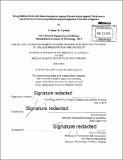| dc.contributor.advisor | Jarrod Goentzel. | en_US |
| dc.contributor.author | Carland, Corinne M | en_US |
| dc.contributor.other | Massachusetts Institute of Technology. Technology and Policy Program. | en_US |
| dc.coverage.spatial | f-ug--- | en_US |
| dc.date.accessioned | 2015-09-17T19:01:17Z | |
| dc.date.available | 2015-09-17T19:01:17Z | |
| dc.date.copyright | 2015 | en_US |
| dc.date.issued | 2015 | en_US |
| dc.identifier.uri | http://hdl.handle.net/1721.1/98636 | |
| dc.description | Thesis: S.M. in Technology and Policy, Massachusetts Institute of Technology, Engineering Systems Division, 2015. | en_US |
| dc.description | Cataloged from PDF version of thesis. | en_US |
| dc.description | Includes bibliographical references (pages 162-168). | en_US |
| dc.description.abstract | Diagnosis of malaria is important in order to ensure early and effective treatment, to facilitate public health surveillance, and to prevent drug resistance. Rapid diagnostic tests (RDTs) are an important tool in resource-constrained settings, as they do not rely on costly lab equipment and specially trained personnel. In Uganda's private sector clinics and drug shops, which is where the majority of patients first seek care, diagnosis of malaria is often presumptive and patients receive neither RDT nor microscopy. Several studies have focused on the patient perspective (e.g. willingness to pay and willingness to be tested) but much less is understood about the supplier perspective (e.g. willingness to stock). This study aimed to understand the preferences and priorities of agents across the malaria RDT supply chain in Uganda on stocking the devices using multi-criteria decision analysis. This methodology was adapted to be relevant and understandable for agents in Uganda so that it was possible to analyze business decisions incorporating a multiplicity of attributes such as selling price, purchase cost, sales volume, complexity of regulations, waste management, and training available. Data surveys and semistructured interviews were collected from 28 private sector retailers (i.e., shopkeepers, pharmacists, clinic managers), two first line buyers, and three distributors. Analysis of the data resulted in the construction of value functions for all agents, the relative weights (therefore the tradeoffs) among decision criteria, and the calculation of an overall value for the decision about whether or not to stock RDTs for the different supply chain agents. Results indicate that the best option for one level of the supply chain is not necessarily the best for another. A discussion offers insights on how to align value across the supply chain, which is important for facilitating public health interventions. | en_US |
| dc.description.statementofresponsibility | by Corinne M. Carland. | en_US |
| dc.format.extent | 168 pages | en_US |
| dc.language.iso | eng | en_US |
| dc.publisher | Massachusetts Institute of Technology | en_US |
| dc.rights | M.I.T. theses are protected by copyright. They may be viewed from this source for any purpose, but reproduction or distribution in any format is prohibited without written permission. See provided URL for inquiries about permission. | en_US |
| dc.rights.uri | http://dspace.mit.edu/handle/1721.1/7582 | en_US |
| dc.subject | Engineering Systems Division. | en_US |
| dc.subject | Technology and Policy Program. | en_US |
| dc.subject | Malaria Rapid Diagnostic Test Evaluation in Uganda | |
| dc.title | Using multi-criteria decision analysis to assess private sector agents' preferences and priorities in stocking malaria rapid diagnostic test kits in Uganda | en_US |
| dc.title.alternative | Evaluating incentives and priorities of private sector supply chain agents to scale up rapid diagnostic tests for malaria in Uganda | en_US |
| dc.type | Thesis | en_US |
| dc.description.degree | S.M. in Technology and Policy | en_US |
| dc.contributor.department | Massachusetts Institute of Technology. Engineering Systems Division | |
| dc.identifier.oclc | 920674295 | en_US |
